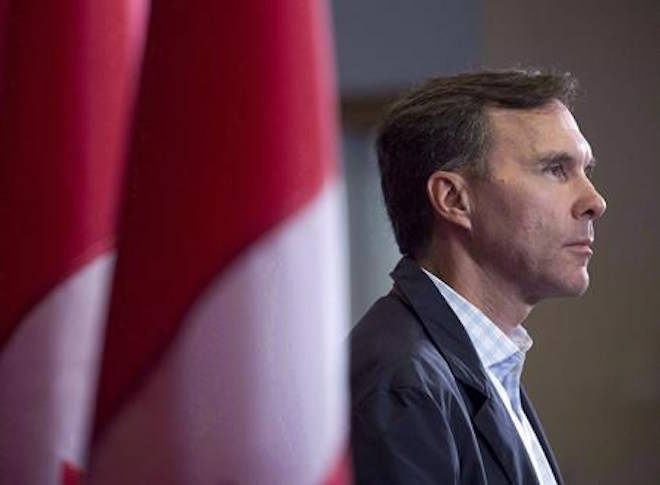The federal ethics commissioner has cleared Finance Minister Bill Morneau of allegations that he and his father benefited from insider information to save half a million dollars on the sale of shares in their family-built company.
Political opponents asked ethics commissioner Mary Dawson to look into several sales of millions of dollars worth of shares in Morneau Shepell Inc. in late 2015 by Morneau and his father. The sales came just days before a major tax announcement that the minister’s accusers say triggered a dip in the stock market.
Morneau’s December 2015 announcement raising income taxes on the highest earners had a wide-reaching market impact, they argued, because it encouraged wealthier shareholders to sell off some their stock holdings before the changes came into effect on Jan. 1, 2016. Doing so meant big savings for the Morneau family, they alleged.
Not so, Dawson said in a Jan. 5 letter to Morneau released Monday: there was no privileged information acted upon, since the tax increase was first announced publicly “well in advance” of the family’s stock sales.
“With respect to the sale of Morneau Shepell Inc. shares in the fall of 2015, I am of the view that you did not benefit from insider information,” writes Dawson, whose seven-year tenure as conflict of interest and ethics commissioner happened to end Monday.
Related: Conflict-of-interest screens working well, Trudeau cabinet ministers say
She referred to statements to the media made Nov. 4, 2015, by then-House leader Dominic LeBlanc, who said the tax measures would take effect on Jan. 1, 2016. Dawson also noted that the Liberals’ 2015 election platform had promised to introduce the tax changes.
“This was well in advance of the sale of your Morneau Shepell Inc. shares on Nov. 30, 2015, and the tabling of the Dec. 7, 2015, ways and means motion on this matter.”
The other sales by Morneau’s father, William Morneau Sr., were made Nov. 23 and Dec. 3.
In a separate examination, Dawson also cleared Morneau of allegations that he was involved in the Bank of Canada’s renewal of its contract with Morneau Shepell to manage its employee pension plan. The Bank of Canada renewed its contract with the company for four years in February 2017.
Dawson said she opted to close the matter after reviewing documents provided by the Bank of Canada and comments sent to her by Morneau’s counsel. “I am satisfied that, as minister of finance, you had no involvement in the Bank of Canada’s decision of the renewal of the Morneau Shepell Inc. contract.”
Morneau’s name, however, has yet to be fully cleared by the ethics commissioner’s office, which has another formal examination underway related to his connection to Morneau Shepell.
The review was launched amid conflict-of-interest allegations over proposed pension reform spearheaded by Morneau. Opponents say the legislation would have brought him personal financial benefit, Morneau has denied the conflict-of-interest accusations.
A spokeswoman for the commissioner’s office confirmed Monday in an email that the examination remains active.
These were all among several high-profile controversies that battered Morneau in the second half of 2017.
In July, he enraged small-business owners by proposing tax-system changes. The ensuing uproar forced him to eventually back off elements of his plan.
He has also faced intense political pressure over how he handled his personal financial arrangements after coming to office. The questions focused on his shares in Morneau Shepell, for which he was executive chairman until his election win.
In response to the controversy, he sold off the remainder of his holdings last fall in the pension management firm, which were worth about $21 million.
He promised to place his other substantial assets in a blind trust. Morneau donated to charity the difference between what the shares were worth at the time of the sale and their value in 2015 when he was first elected — estimated at about $5 million.
Dawson also fined Morneau $200 for failing to disclose his role as a director in a private corporation that owns a villa in France. Morneau had disclosed his ownership of the villa, but — owing to what his office called an administrative oversight — failed to mention the ownership structure itself.
On Monday, a spokeswoman for Morneau said that his office was “pleased with the outcome” of the commissioner’s latest examination.
“The minister will continue to work with the office of the ethics commissioner to ensure he is in full compliance with the rules,” Chloe Luciani-Girouard wrote in an email. “The minister has gone above and beyond the initial recommendations from the ethics commissioner by divesting all his family’s holdings in his former company.”
However, Conservative finance critic Pierre Poilievre continued to say Monday that Morneau was wrong to sell his shares shortly before introducing the tax hike on the wealthiest Canadians — whether or not he actually broke conflict of interest rules.
“Conservatives believe it is unwise for ministers to buy or sell shares in the weeks immediately before the introduction of tax measures,” Poilievre said in a statement.
“Finance ministers should lead by example. It is not good enough for ministers to boast that their actions are not illegal.”
Andy Blatchford, The Canadian Press



